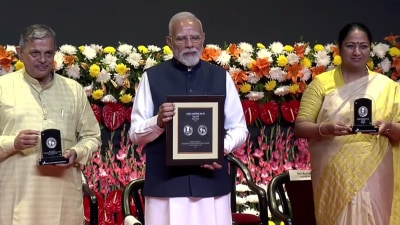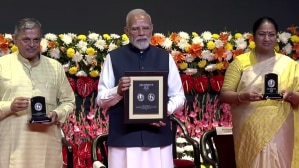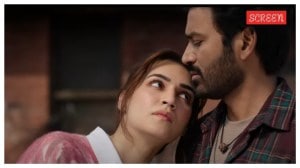The way of the wheel
The Janata Dal, which has been grappling with dilemmas of existence almost before it was born, is not unfamiliar to ironical situations. T...

The Janata Dal, which has been grappling with dilemmas of existence almost before it was born, is not unfamiliar to ironical situations. Tuesday witnessed two of its prominent leaders — V.P. Singh and H.D. Deve Gowda — lead a demonstration against the NDA’s government’s “anti-people” policies in Chennai even as another well-known leader from this party — Ram Vilas Paswan — launched his own political outfit, the Jan Shakti, in Delhi. There is rich irony in all this for the itinerant chronicler. Both events took place amidst high voltage, pro-poor rhetoric and all the three leaders claimed to fight for the interests of the most marginalised. Yet, Singh and Deve Gowda spoke from a position of opposition to the BJP, while Paswan found the confines of the BJP-led NDA comfortable enough for the present and took care to emphasise that his Jan Shakti will remain an integral part of the ruling coalition.
Such fissiparous tendencies in a political formation that threw up more leaders than camp followers, and some would say more platitudes than action, should surprise no one. The formation of Jan Shakti marks the seventh major split of the Janata Dal, that mother of all parties, in a decade. Invariably, it was a mix of personal ambition and caste politics, in varying proportions, that fuelled the splits. Whether it was in the creation of George Fernandes’ and Nitish Kumar’s Samata Party, or Naveen Patnaik’s inheritance, the Biju Janata Dal; whether it was in the making of Laloo Prasad Yadav’s Rashtriya Janata Dal or H.D. Deve Gowda’s Janata Dal (Secular), the one common feature was a leader in search of political relevance. For years they pretended that it was their “secularism” that made them unique, until a section gave up on even that pretence by aligning with the BJP to form the NDA coalition at the Centre.
Paswan’s Jan Shakti is no exception to this politics of opportunism. The man whom V.P. Singh once famously described as India’s future prime minister, was clearly getting restive within the Janata Dal (United) and his relationship with its president, Sharad Yadav, had soured irredeemably. The big question, of course, is whether the Jan Shakti will eventually metamorphose into a party representing the political consolidation of Bihar’s Dalits, something like Kanshi Ram-Mayawati’s Bahujan Samaj Party in UP. Paswan has two objectives — one short term, the other more long term. His immediate concern is to act as a pivot for anti-Laloo sentiment in Bihar, and he sees his ties with the BJP as being central in achieving this. It is for this reason that he accuses other potential leaders of the state for having sold out to the RJD and projects himself as Laloo’s only real threat. His more ambitious project is to emerge as a pan-Indian Dalit leader. The slogans raised in Tuesday’s rally — “òf40óBachcha, bachchaBhim ka, Ram Vilas ki team ka” — expresses this intent succinctly. However, ironically enough, his success in achieving this would depend on how far he can temper his personal ambition to achieve the larger goal. Going by the Paswan brand of quick fix populism and personality politics, this could take some doing.



- 01
- 02
- 03
- 04
- 05




























